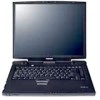Toshiba PS610U-NGYSG7 User Manual - Page 243
Using Shut down, Shutting down more quickly
 |
View all Toshiba PS610U-NGYSG7 manuals
Add to My Manuals
Save this manual to your list of manuals |
Page 243 highlights
243 Using Shut down ❖ While in Standby mode, the computer uses some battery power. ❖ When starting up again, this choice uses less time and battery power than does Shut down or Hibernation. ❖ On restarting, the computer returns to the mode in which you left it, and opens all the programs and files you were using. NOTE: If you power down using the Standby command and the battery discharges fully, your information will be lost. Be sure to save your work often. Using Shut down To power down the computer using the Shut down command, click Start, Shut Down, select Shut down, then click OK. Sample Shut Down Windows dialog box The computer turns itself off. Shutting down more quickly You can also shut down the computer by either pressing the power button or closing the display panel.















